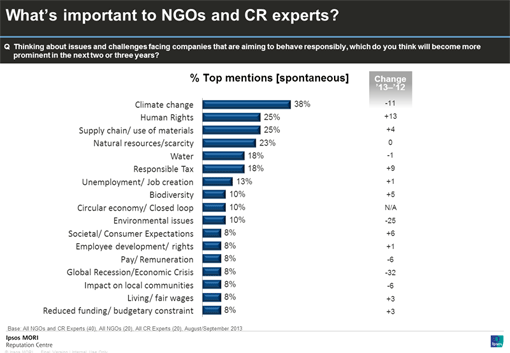The NGO Perspective: A recipe for good behaviour

Climate change continues to weigh heavy on the minds of NGOs and Corporate Responsibility experts but it’s not just about companies showing respect for the earth, it’s also about showing respect for the individual.
Non-Governmental Organisations (NGOs) and Corporate Responsibility (CR) experts recognise climate change as a key challenge in the coming years for large organisations who wish to be perceived as behaving responsibly; climate change remains the most pressing issue mentioned by 38 percent of our sample*.

One CR expert cited that:
“We are going to have global negotiations at the end of 2015 on international agreement on climate change, that is going to be very prominent as an issue for the next few years and again companies' responsibility around that will be high profile.”
Companies need to be seen to integrate sustainability into their business strategies and demonstrate that they are aware of the limited supply of the resources they use and adapt their business practices accordingly. NGOs and CR experts have high expectations of large companies and just 20 percent of NGOs and CR experts agree that ‘most large companies in the UK are incorporating sustainability into their business strategies’. In addition to this, social issues may often be overlooked by companies – one CR expert stated that there needs to be “more focus on human rights, the social elements tend to get ignored, children's rights, women's rights”. 2013 has seen these social issues, in the context of ‘human rights’, soar up the rankings to the second most important issue, increasing in prominence from just 12 percent of NGOs and CR experts mentioning this in 2012 to 25 percent in 2013. NGOs and CR experts also believe that there will be more pressure put on companies regarding human rights following a new framework on UN Guiding Principles set out in 2011. The collapse of factories such as Rana Plaza in Bangladesh in April 2013 may also have led to issues of ‘human rights’ becoming more top of mind among NGOs and CR experts. Similarly, media coverage around the actions of activists such as the Greenpeace Arctic 30 who sailed north to protest against drilling in the Arctic – also brings this to the forefront of individuals’ minds.
 “Increasingly consumers will raise questions about what is involved in the manufacture and marketing of the goods they purchased, they will want to know that they were produced in non-exploitative ways, that a decent living wage was paid and that manufacturing facilities were safe, that women had proper treatment, that child labour was not used.” – CR Expert
Furthermore, while 2013 sees the recession and the economic climate drop in prominence among NGOs and CR experts (40 percent mention this as a future challenge in 2012 compared to just 8 percent in 2013) that is not to say that large companies are not still hindered by the financial crisis. Instead, NGOs and CR experts’ concerns regarding company behaviour appear to have shifted towards other types of negative behaviour such as corporate tax avoidance, which like the financial crisis also has the ability to tarnish a company’s reputation. This is reflected in increased mentions of ‘responsible tax behaviour’ - an issue, which has doubled in importance since 2012 (up from 9 percent in 2012 to 18 percent in 2013).
In line with this, the general public appear to have become more cynical about the behaviour of large companies and in particular their CEOs. According to Ipsos’ Global Advisor survey**, less than one in five (19 percent) of UK citizens agree that ‘CEOs of large companies can generally be trusted to tell the truth when they make statements about their company or industry’.
Echoing the general public’s cynicism, our NGO and CR experts also believe that large companies are still not thought to be living up to expectations. More than two in three (68 percent) of NGOs and CR experts interviewed agree that ‘companies in the UK are not focusing on their sustainability strategies’.
“Increasingly consumers will raise questions about what is involved in the manufacture and marketing of the goods they purchased, they will want to know that they were produced in non-exploitative ways, that a decent living wage was paid and that manufacturing facilities were safe, that women had proper treatment, that child labour was not used.” – CR Expert
Furthermore, while 2013 sees the recession and the economic climate drop in prominence among NGOs and CR experts (40 percent mention this as a future challenge in 2012 compared to just 8 percent in 2013) that is not to say that large companies are not still hindered by the financial crisis. Instead, NGOs and CR experts’ concerns regarding company behaviour appear to have shifted towards other types of negative behaviour such as corporate tax avoidance, which like the financial crisis also has the ability to tarnish a company’s reputation. This is reflected in increased mentions of ‘responsible tax behaviour’ - an issue, which has doubled in importance since 2012 (up from 9 percent in 2012 to 18 percent in 2013).
In line with this, the general public appear to have become more cynical about the behaviour of large companies and in particular their CEOs. According to Ipsos’ Global Advisor survey**, less than one in five (19 percent) of UK citizens agree that ‘CEOs of large companies can generally be trusted to tell the truth when they make statements about their company or industry’.
Echoing the general public’s cynicism, our NGO and CR experts also believe that large companies are still not thought to be living up to expectations. More than two in three (68 percent) of NGOs and CR experts interviewed agree that ‘companies in the UK are not focusing on their sustainability strategies’.

Consequently, while climate change remains an integral issue for NGOs and CR experts, arguably, it is the issue of human rights, which is growing in importance among these stakeholders and is possibly being overlooked by companies themselves. Large global companies, in particular, must take action on social issues such as these and be seen to pay greater respect to individuals – all of which is a recipe for good behaviour.
*Ipsos’s NGO Responsibility study runs annually, interviewing c.40 NGOs and CR experts; interviews are conducted via telephone. ** Ipsos's Global Advisor Study runs monthly, interviewing c.1,000 adults online panellists, aged 16-64 (18-64 in the US and Canada) across 25 core countries. Data is weighted.



